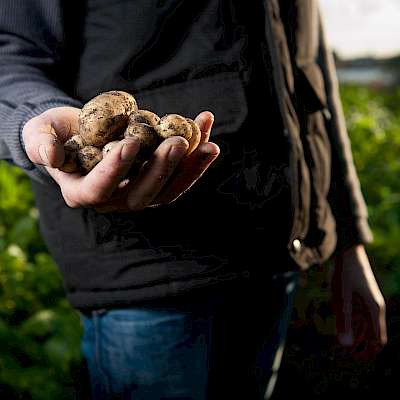In this article we share some of the action being taken by alliance organisations, farmers, restaurants and many others to step up to the challenges presented by COVID19.
We also begin to think about the future and how learning from what is happening now can help to inform responses to the climate and biodiversity crises.
UK farmers stepping up to the challenge
Food and farming businesses across the country are reworking their business models and innovating as they react to the new trading environment. Food delivery and digital subscription services have witnessed a surge in sales with consumers forced to stay at home, which has prompted farm enterprises to adapt their selling strategies.
Farm shops have seen record sales in online delivery at the same time that they have seen orders from restaurant, pubs and caterers drop off. Smaller farming business have stepped in when larger retailers have not been able to meet demand
Sustain have set out five ways we can all support farmers at this time including by buying from them directly, showing patience, wasting no food and perhaps even getting out on to a farm to lend a hand.
The Landworkers' Alliance have called on the UK Government to provide an emergency 'Land Army' package to protect local food supplies.
How to buy from nature friendly farmers online

Are you finding it difficult to buy delicious vegetables, pulses, meat and dairy produced by nature friendly farmers?
Why not check out Pasture for Life farmers who deliver? There are also a range useful signposting organisations include Big Barn, Fresh Range, Farmers Weekly map, Farm Retail Association farm shops, buying organic, box schemes, Open Food Network, Better Food Traders, FarmDrop - and there are many more if you search around locally and in your local media.
Restaurants, cafes and others change their business model to meet demand
Many businesses have been changing how they work to respond to the pandemic and the supply issues associated with supermarkets. We have seen catering suppliers switching to home delivery, restaurants delivering veg boxes and meals for vulnerable people and eco-community cookery school Made In Hackney are now delivering meals to vulnerable people and have begun to move some of their cooking classes online.
The Sustainable Restaurant Association are providing up-to-date advice and support for UK foodservice providers during the coronavirus pandemic.
Coronavirus brings food insecurity to the forefront

Alliance organisations such as Food Foundation, Sustain and Nourish Scotland have been highlighting the need to think about how we support low-income households during this time and beyond.
Food Foundation have set out data showing that millions of people in the UK will need food aid in the coming days… as the coronavirus outbreak threatens to quickly spiral into a crisis of hunger unless the government acts immediately.
Nourish Scotland explain that running out of food is not a problem of supply, but a problem of distribution. Nourish Scotland set out the figures required to ensure that people with insecure access to food can choose and eat the food they need. In a separate article they outline the importance of building dignity into responses to food insecurity.
Sustain has coordinated a response with alliance organisations and others for Government to release funds so that people can buy the food they need to be able to self-isolate.
The Food Ethics Council recently held an online discussion that helped civil society organisations explore what is already being done and can be done, watch here.
Many of the food supply issues that we are currently facing expose existing tensions in our society. These issues are addressed in Professor Tim Lang’s new book ‘Feeding Britain’ where he considers the how people, environment and local networks need to be supported to compete with long, opaque supply chains.
Alliance organisations and others consider implications for the climate and biodiversity crises
Alliance organisations have turned their attention to longer term implications of COVID19 and how we can learn from it to help address the climate emergency and wider food supply issues.
Forum for the Future are considering whether Coronavirus could be a dress rehearsal for the climate emergency and whether the current crisis could help to influence financial reform and help shift societal norms and behaviour.
Greenpeace UK set out how recovery measures (specifically economic) could be part of the solution for the climate emergency.
The UN’s environment chief Inger Andersen has said that humanity is placing too many pressures on the natural world with damaging consequences, and warned that failing to take care of the planet meant not taking care of ourselves.
Tweet @Eating_Better to share thoughts and comments.
